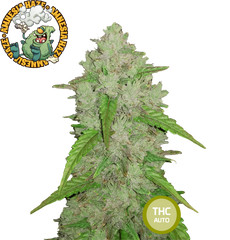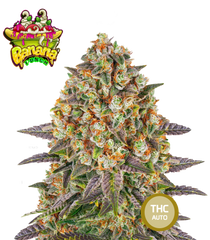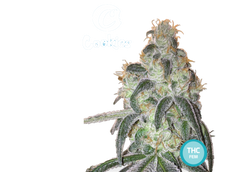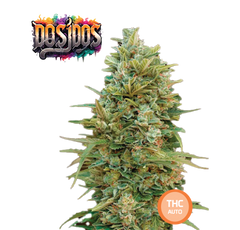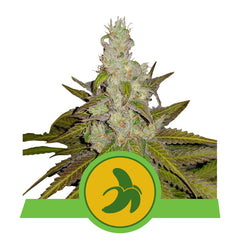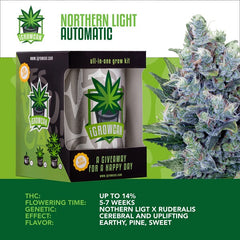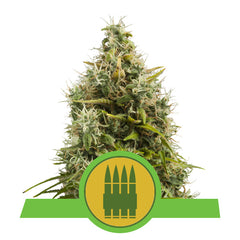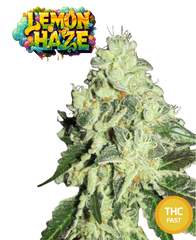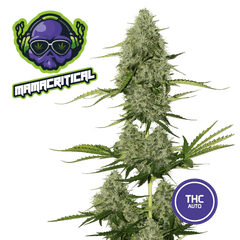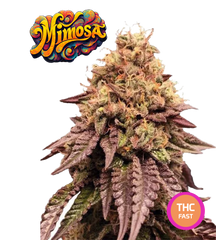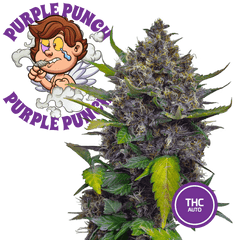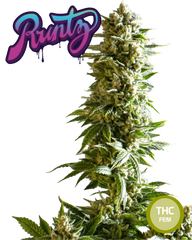The benefits of organic food, without the use of chemical fertilizers and pesticides, are increasingly evident, both for health and for the environment, becoming almost a form of resistance to mass cultivation. So why not replicate this approach also for the cultivation of our "girls"?
Fruit and vegetables from intensive cultivation, which use very low-cost products, forced to grow in a very short time, have a whole series of disadvantages. In fact, harmful pesticides are often used that cause damage to the health of consumers. Even at an organoleptic level they prove to be poor: the perfect aesthetic appearance often hides an almost non-existent flavor and poor nutritional values. This type of "industrial" cultivation, moreover, creates inestimable damage to the environment: pollution and over-use of land, pollution of aquifers and air, water waste and much more.
Chemical fertilizers, pesticides and fungicides are not only used for food, but also for growing cannabis, causing the same harmful effects as it is smoked and ingested. Surprisingly, organic cannabis growing is a fairly recent concept.
The history of organic farming

Humans have been cultivating cannabis for millennia, and until recently, little was known about it. It was a remarkably hardy and flexible plant species that can grow anywhere it finds a climate that is favorable to its growth: from the mountain rangesof Afghanistan to the sunny skies of California.
Things changed with the ban at the beginning of the 20th century and, with the beginning of the "war on drugs" led by America in the early 70s, the situation became even more serious. This caused a stigmatization of this crop, with a consequent reduction in variety, quality and quantity produced. To overcome this inconvenience, chemical fertilizers began to be used to maximize yields. This, as often happens, caused a chain reaction of negative effects: + pesticides = + diseases = + parasites = + pesticides and so on.
Modern Organic Methods: What It Means to Farm Organically Today

The situation has changed profoundly, finally. It is not only the yield that is taken into consideration, but also and above all the quality and aromatic spectrum of the plant, as well as the potential damage to health caused by chemicals. Times have changed. People have realized that productivity is not the only important factor when growing cannabis. Cannabis cultivation/culture has therefore found a perfect marriage with organic cultivation, producing incredible offspring!
Growing Organic Cannabis; Growing Organic Hemp with Organic Soil and Organic Fertilizers

The concept of growing cannabis organically was strongly promoted by Jeff Lowenfels , a Harvard-educated Alaskan lawyer and avid grower. He argued that organic farming could satisfy the entire natural life cycle of plants and soil microorganisms. This chain preserves a complex living system present underground and its interaction with the environment, plants and animals.
A good example that farmers have used since the beginning of time is to leave fallen leaves in order to fertilize the soil naturally in spring. The principle is to keep things as natural as possible , reducing human intervention to a minimum.
Growing cannabis organically, especially Sativa strains and legal CBD- rich cannabis, requires cultivation techniques that respect the natural balance of the soil. Using organic material, such as compost and wood chips, allows you to enrich the soil food web without the use of artificial substances. Organically grown Sativa hemp benefits from a nutrient-rich soil mix, which supports healthy growth during the vegetative cycle and flowering phase.
In this method, pest control is managed with natural remedies such as neem oil, avoiding other harmful chemicals. Organic fertilization, without synthetic liquid fertilizers, ensures that the plant roots absorb nitrogen and other nutrients harmoniously. The result is a superior quality product, free of chemical residues, which responds to the growing demand for light cannabis and legal hemp, both for recreational and therapeutic purposes.
Respect for soil pH and the use of organic cultivation methods guarantee sustainable production, in harmony with nature, contributing to a legal cannabis market that is increasingly aware and attentive to product quality.
Microorganisms and their important role in hemp cultivation

Microorganisms that live underground play a very important role in organic crops, helping to produce nutrients for plants through the synthesis of residues and other elements in the soil. This natural process has two benefits: the organisms help to fertilize the plants, while at the same time eliminating potentially harmful residues .
In conventional crops with synthetic fertilizers, nutrients are directly assimilated by plants. In organic crops, however, the measures adopted are aimed at conditioning the soil to facilitate the development of microorganisms, naturally stimulating plant growth.
How to Grow Organic Hemp

Before we find out how to grow cannabis organically, there are a few things to consider.
Indoor cultivation cannot take advantage of a "natural cycle" being confined in a closed space. For example, when an indoor crop is infested with pests, natural predators will never be able to intervene. In these cases, the grower will have to use certain treatments if he does not want to lose the entire harvest. The thing that an indoor grower can do is use natural fertilizers and pesticides (such as the excellent Italian brand Biomagno ), in full compliance with the principles of organic farming.
Organic cannabis must grow in a natural substrate

Returning to the subsoil, the first step to growing organically is to use naturally processed soils: it is essential to create the optimal environment for microorganisms, which will help provide nutrients to the plants. The best types of organic soil to plant our hemp seeds in are mixtures of compost , worm castings (or vermicompost ), perlite, seaweed meal , bat guano , pumice , fish emulsions , peat moss and other compounds present in different proportions.
For those who have never grown organically, there are two possible paths. First, buy all the ingredients to add and mix separately following a recipe for making organic soil (compost, vermicompost, etc.). Or, buy pre-mixed "super-soils" from specialized growing shops. This is the most recommended if you are new to organic growing, since pre-mixed soils require much less maintenance. In these cases, the grower will only have to add the correct amounts of water, making sure that the soil (or the microorganisms it contains) will take care of everything else.
The soil mix is probably the most important part of an organic cannabis grow, but there are other factors. Some organic growers argue that the entire growing environment should be set up as one ecosystem, maintaining a healthy balance between soil, temperature , humidity, airflow, lights , etc. Since all of these factors influence each other, you will need to look at the entire ecosystem.
Fertilizers in organic cannabis cultivation

The nutrients your cannabis plants absorb will be produced by microorganisms in the soil, which means you won’t need to add any additional nutrients or supplements, and you won’t need to interfere with your crops. In short: you’ll need just the right amount of water.
However, organic hemp growers can now find numerous organic farming products that can help boost the growth of their little girls. Most organic cannabis growers use "compost teas", special fertilizer mixes that offer multiple benefits, such as supporting the microorganisms in the subsoil and keeping diseases at bay. A quick search on the internet will find several recipes for making excellent compost teas that can greatly benefit you.
Mycorrhizal fungi are a powerful natural stimulator for plant growth

Adding mycorrhizal fungi to organic soil when growing cannabis can be another great natural way to boost plant growth. These fungi form a symbiotic relationship with plants, increasing their ability to absorb nutrients and water. Some commercial organic fertilizers already contain mycorrhizal fungi, but they can also be purchased separately. Introducing these organisms into the soil offers great benefits throughout the entire growth cycle of the plants.
Biological pest control

When growing hemp organically, especially outdoors, the most common pests can be controlled without the use of synthetic insecticides. Natural solutions can be just as effective in managing pests and do not contain chemicals.
To combat some families of aphids, such as red spider mites and other common pests, you can use foliar products with neem oil , whose effectiveness is now recognized. Bacillus thuringiensis is another organic remedy that can eradicate midges , mosquitoes and some lapidoptera larvae.
Companion planting keeps pests away

If you have large cultivation surfaces, always speaking of outdoors, the association of plants is another method to control parasites in a natural and organic way. This agricultural practice consists of planting nearby plants with natural repellent properties. Aphids do not like the presence of marigold , while basil and dill keep away soil flies. For almost every common parasite there is the corresponding repellent plant. We therefore recommend a brief search on the internet depending on the case, which can provide useful detailed information.
Why should I grow cannabis organically?
In addition to the above issues regarding crop quality and potential health problems, it can also trigger nutrient lockout due to overuse of chemicals that build up in the soil, which in turn can trigger nutrient deficiencies in the plants. These are quite common among novice growers.
100% organic cultivation is risk-free because the nutrients are not added directly to the plants, but instead feed microorganisms that are beneficial to the plants. This is why overfertilization is unlikely to occur in an organic crop. In addition, you no longer have to worry about the pH of the water or fertilizer solutions, because organic soil is more “resistant” to such changes.
With chemical fertilizers, almost 90% of the nutrients are lost. In fact, only a small percentage is assimilated by the plants, while the rest spreads into the substrate through irrigation. The most common universal potting soil mixes deplete nutrients over time, which means they must be replaced every cycle. An organic mix can be “refreshed” every season with the addition of mycorrhizal fungi , which also produces a greater economic.
No less important is the result: supporters of organic marijuana consider that the quality of the final buds is clearly superior, larger and more aromatic, thanks to the absence of chemicals. If you like growing cannabis, consider organic cultivation as a more sustainable alternative.




